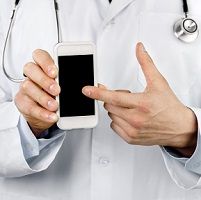Article
Rural Diabetes Care? There's (Maybe) an App for That
Author(s):
For those with type 2 diabetes who reside in rural communities, distance from large medical centers and research universities may limit their access to new ideas and programs. The result may be poorer disease management and less physical activity than is reasonable or necessary. Welcome: mobile apps.

People in cities have traditionally had access to a broader range of services than those who live in the country. For those with type 2 diabetes (T2D) who reside in rural communities, their distance from large medical centers and research universities may limit their access to new ideas and programs. The result may be poorer disease management and less physical activity than is reasonable or necessary.
Welcome: mobile apps. Researchers have expanded efforts to determine if mobile apps can kick-start self-management activities. They're investigating ways to educate diabetics, provide problem solving help, and assist patients with self-management. A new study in Telemedicine Journal and e-Health identifies perceived barriers, benefits, and facilitators related to free mobile app use among rural adults with T2D.
These Michigan State University researchers looked at apps available in Apple App Store or Google Play Store for diabetes management or behavior monitoring, and enrolled 8 adults who owned Smartphones into 4 focus groups. They selected 4 apps, including Glucose Buddy, mySugr, MyFitnessPal, and MapMyWalk, to be analyzed.
The researchers asked participants about their general app and health-specific app usage. Participants tested the 4 apps, and provided feedback.
Participants identified potential barriers to use or continuing use. They indicted that limited awareness of existing health apps and their functions is a primary barrier. The researchers note that limited awareness is not exclusive to the participants in their study. Adoption of health-or-medical-related mobile apps is much lower than use of other types of apps (e.g. games or online banking apps). In addition, participants said that their doctors had not recommended any apps, and uptake would be greater if they did.
Participants preferred apps that were intuitive in design. They liked features like camera-based scanning and automated tracking. They identified poor self-motivation as a barrier, too. A perceived benefit was the ability to set realistic and specific daily goals. Though they had some concerns about privacy, but did like the idea of sharing tracked data with healthcare providers.
The takeaway for healthcare providers and endocrinologists may be that it's time to examine available apps, identify those that patients can use, and recommend them in situations where they may be able to improve a patient’s health.
Related Articles:
- Fighting Fat with Fitbit, Text Messages, and Other Electronic Interventions to Promote Exercise
- Real World Research: Rob DiCicco Speaks About GSK's New Mobile RA Study
- Text Motivation: Study Delivers Messages Encouaging Physical Activity





